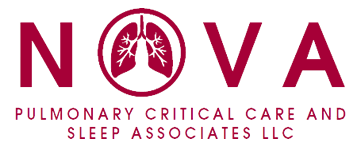About COPD
COPD is a major health issue that currently affects an estimated 16 million American adults. If you are one of the many diagnosed with this illness, we know you have many questions about COPD life expectancy, symptoms, and treatment. The specialists at NOVA Pulmonary Critical Care and Sleep Associates are here to help.
As Northern Virginia’s top-rated sleep clinic, we serve areas like Dulles, Lansdowne, Leesburg, Reston, Chantilly, Fairfax, Washington DC and more!
Our specialists will help you find the causes of your COPD and give you access to effective treatments that improve your sleep. Book an appointment below!
What is COPD?
COPD is the acronym for Chronic Obstructive Pulmonary Disease, which is a group of progressive lung disorders. Most people with COPD have both emphysema and a chronic case of bronchitis. This long-term lung disease can make it incredibly hard to take each breath. It is the third leading cause of disease-related death in the United States.
When a patient has this illness, the airways in the lungs become severely inflamed. As a result, the inner tissue that helps oxygen pass through is destroyed, and airflow becomes restricted in the lungs. This first brings a mild but persistent cough, a need to clear your throat (especially after waking up), and the occasional bout of shortness of breath. But from there, symptoms can progress into chronic wheezing, tightness, cough, and a shorter life expectancy.
In the state of Virginia alone, 6.1% of people are struggling with COPD. We can help treat your symptoms here in Northern Virginia so you can enjoy a better life.
Causes of COPD
What causes COPD? Well, there are several factors. Over time, your lungs are exposed to irritants that will cause damage to the airways, and that puts you at a higher risk based on the following:
- The most significant cause is cigarette smoke. Smoking cigarettes cause nearly 90 percent of all cases. With over 7,000 chemicals emitted when a cigarette burns, the toxins have a powerful opportunity to weaken the lungs.
- If you have asthma and smoke cigarettes, your likelihood of developing COPD is even higher than smokers without asthma.
- Even if you don’t smoke, you can still get COPD through second-hand smoke and other factors.
- Exposure to chemicals, fumes, and air pollution can also lead to COPD symptoms. Chemicals from construction work, painting, or crafting can all be contributing factors. If you are around these chemicals frequently, it’s essential to take proper ventilation measures.
- There also may be a genetic predisposition in certain people. A deficiency in the protein alpha-1-antitrypsin can cause the lungs to deteriorate, leading to COPD.
If you suspect you are developing this illness, you should make an appointment with our pulmonary specialists at your earliest convenience.
Symptoms of COPD
Early symptoms
Early symptoms of COPD may include, but are not limited to:
- Trouble breathing
- Shortness of breath
- Loss of breath
- A consistent cough that may produce mucus
- Chronic respiratory infections
- Low energy levels
Middle symptoms
As symptoms progress, they will begin to get worse. Many people notice an increase in their coughing and production of mucus. Also, the moderate state of COPD can include:
- Increased breathlessness
- Consistent cough, more mucus production
- Wheezing in the lungs
- Pain or tightness in the chest
- Trouble exercising or performing activity due to loss of breath
Late symptoms
In the late stages of COPD, things will continue to get worse. Symptoms may include:
- Swelling in the ankles, feet, and legs
- General fatigue from any activity due to breathlessness
- Weight loss
If you notice any grade of the COPD symptoms listed above, it’s a good idea to make an appointment with the specialists at NOVA Pulmonary Critical Care and Sleep Associates.
Diagnosis of COPD
Wondering how COPD is diagnosed? Early detection is key to a successful diagnosis and treatment plan.
Testing
When you visit your doctor for symptoms of COPD, they will run various tests and exams to ensure the correct diagnosis. One of these tests is called spirometry. This is a simple test that measures how strong your lungs are. It requires the patient to blow air into a mouthpiece with a tube attached to a machine that will measure how fast you can blow and how much air you can produce. This is a great way to detect COPD before most symptoms develop. In addition to offering a diagnosis, spirometry tests can also determine how severe the diagnosis is.
A doctor may also order a chest x-ray or arterial blood gas test. The blood gas test will evaluate levels of oxygen in the blood while the x-ray reveals blockages.
History
Family and personal history is also an important factor to properly make a COPD diagnosis. You must tell your doctor any symptoms, related family illnesses, or possible irritant exposure you’ve had. Don’t forget to mention:
- A history of smoking or exposure to cigarette smoke
- Frequent exposure to chemicals, smoke, or dust
- Symptoms including shortness of breath, increased mucus production, and chronic cough
- Family members with lung problems or COPD
The physicians at Pulmonary Critical Care and Sleep Associates can help determine the proper diagnosis for your COPD symptoms. Schedule an appointment to learn your status today.
Treatment of COPD
While it may be hard to cure COPD completely, there are many treatment options available to reduce the symptoms and progression.
- Medication – COPD treatment medications, called bronchodilators, can relax the lung airways and make it easier to breathe. They’re helpful to use in treatment with an inhaler or nebulizer. Additionally, glucocorticosteroids will reduce airway inflammation. Other medications, such as the pneumococcal vaccine, tetanus booster, and yearly flu shot, may be recommended for additional support.
- Oxygen therapy – Supplemental oxygen through a face mask can make it easier to breathe. It can even be taken continuously with the help of a portable oxygen unit.
- Surgery – When this condition is severe, sometimes surgery is the best option. A procedure called bullectomy allows surgeons to remove abnormal air spaces called bullae from the lungs. Volume reduction surgery removes damaged upper lung tissue. In the most severe cases, a lung transplant may be necessary.
- Lifestyle changes – If your doctor catches your condition in the early stages, there are several lifestyle changes you can make to offer relief. Quit smoking, improve nutrition in your diet, and get exercise to help.
Are you ready to get started on your COPD treatment and breathe easy once again?
Schedule Your Appointment Today!
Schedule an appointment today with the pulmonary specialists at NOVA. We can offer you treatment in any of the four stages. Book your appointment now for the relief you need to live as healthily as possible.
Meet the team at NOVA Pulmonary Critical Care and Sleep Associates

Dr. Aditya N Dubey, M.D, F.C.C.P. – Founder
Specialty:
Pulmonary, Critical Care and Sleep Medicine
Board Certified by American Board of Internal Medicine in the Subspecialities of Pulmonary Medicine, Critical Care Medicine and Sleep Medicine. Learn more about Dr. Dubey

Dr. Petra Thomas, M.D.
Specialty:
Pulmonary Medicine
Board Certified by American Board of Internal Medicine in the Subspecialities of Pulmonary Medicine. Learn more about Dr. Thomas

Dr. Arman Murabia, M.D.
Specialty:
Pulmonary, Critical Care and Sleep Medicine
Board Certified by American Board of Internal Medicine in the Subspecialities of Pulmonary Medicine, Critical Care Medicine and Sleep Medicine. Learn more about Dr. Murabia

Rebekah Lee, AGNP-C
Nurse Practitioner. Learn more about Rebekah Lee

Christine Amorosi, AGNP-C
Nurse Practitioner. Learn more about Christine Amorosie
Office Locations
Conveniently located near you in Loudoun and Fairfax VA
NOVA Pulmonary – Dulles
24430 Stone Springs Boulevard
Suite 200
Dulles, VA 20166
NOVA Pulmonary – Lansdowne
19415 Deerfield Avenue
Suite 301
Landsdowne, VA 20176

